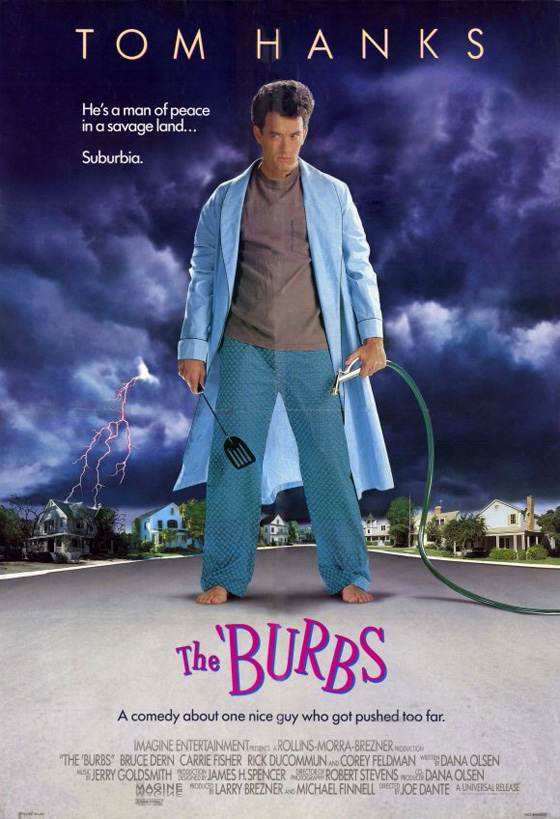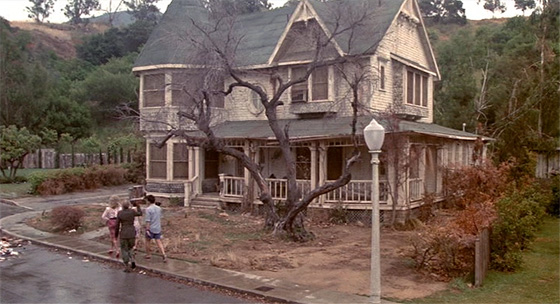
The ‘Burbs (1989) was something of a seminal moment in my coming-of-age. Let me explain. I saw the film in the theater, with my family and with a very dim notion as to what it was that I was walking into. Immediately I was enthralled by the plot: suburbanite dad Ray Peterson (Tom Hanks), his obnoxious and nosy friend Art (Rick Ducommun, Groundhog Day), and overequipped Vietnam vet Rumsfield (Bruce Dern) become suspicious that their reclusive new neighbors, the Klopeks, are up to something sinister in their cellar. The scenario is really an excuse for director Joe Dante and writer Dana Olsen (Going Berserk) to pay tribute to horror movies of the 60’s and 70’s, and in doing so fits snug into Dante’s movie-loving filmography. I lived in the suburbs, and my father obsessed over the perfect green lawn, so I related to the setting, even though it was obviously a Universal backlot. This studio suburb seems to exist in the same fictional universe as Dante’s beloved TV series Eerie, Indiana (1991-1992), but it recalls old television, with the out-of-place, dilapidated Klopek residence squatting in the center of the street like the Addams Family or Munsters house confronting the sunny prefab development of Leave it to Beaver. All of this undoubtedly triggers nostalgia in Dante, and it triggered nostalgia in me, too, somewhat by proxy, since I was raised on 50’s and 60’s sitcoms as they were recycled through syndication in the 80’s. Anyway, I was hooked from the start, and loved the movie all the way through. When I was confronted by Roger Ebert’s two-star review (even then, I read him religiously), and other mixed-to-negative reviews, it felt like a punch to the gut. Why do I remember the impact of reading a damn review, all these years later? I can only think that here, when I was twelve-going-on-thirteen, I started to really become aware of critics and the wider landscape of critical opinion; it was a step to learning how to measure my own opinions and where they landed in that new landscape. That – and there’s a scene where Hanks is flipping channels late at night, every channel showing a gory and disturbing horror film. I wasn’t allowed to watch that kind of film; I was stuck with the old masters (1930’s Universal monsters). These brief images of human sacrifice, Texas chainsaws, and Exorcist vomit suggested a whole world to explore just one door over. So I have Joe Dante to thank for that too.
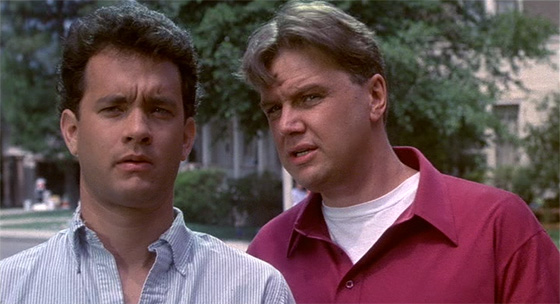
Ray (Tom Hanks) and Art (Rick Ducommun) dare each other to introduce themselves to their new neighbors.
A few years ago I’d revisited Dante’s Innerspace (1987), another film I watched over and over in my adolescence, and was somewhat disappointed – the film didn’t glow as brightly as it did in my memory. Therefore I approached revisiting The ‘Burbs, which I hadn’t seen since the early 90’s, with some apprehension; but watching Ti West’s recent Trailers from Hell entry on the film sent me off to the video store. The nostalgia from watching that trailer was just overpowering. But what if Ebert was right? I’m happy to report that the film was both exactly as I remembered and better, too. It’s aged very nicely, in part because of that studio backlot and Dante’s effort to recreate the enclosed suburban world of TV sitcoms. It doesn’t look much like an 80’s film – that is, until Corey Feldman shows up, doing a Bill & Ted act and bringing a Valley Girl girlfriend along who’s pretty in pink. Well, there’s no such thing as “timeless.” An extra dimension of enjoyment I received on this viewing was suddenly understanding movie references that went over my head the first time. When “The Doctor” (the wonderful Henry Gibson) first arrives, he emerges from a basement door built into the stairs in the exact same layout as the basement portal in Psycho (1960). I laughed when Feldman asks Hanks if he’s ever seen The Sentinel (1977) – of all the films to explicitly reference in a Hollywood movie! – and appreciated the cameos from Dante company players Robert Picardo and Dick Miller. When I first saw this film, I thought of Dick Miller as that guy from Joe Dante movies; now I call him the guy from Roger Corman’s movies.
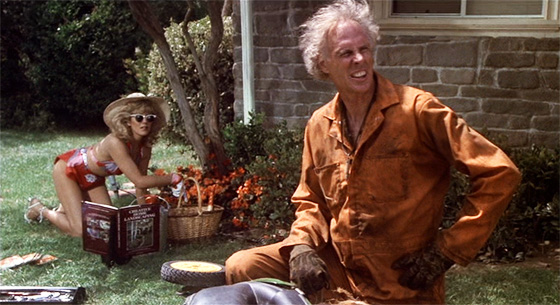
Wendy Schaal and Bruce Dern as the Rumsfields.
Another revelation on this viewing: I really miss the pre-Philadelphia Tom Hanks. I watched a lot of Hanks comedies growing up, because my mother and older sister were fans of his cross-dressing sitcom Bosom Buddies (1980-1982); that meant we had to go see Splash (1984), The Man with One Red Shoe (1985), and The Money Pit (1986) as they hit theaters and drive-ins (and then, on the ride home, my mother would apologize for all the sex jokes). I was reminded of just how good Hanks’ comic instincts were. There’s a beautifully stupid moment when Art, holding a human femur that Ray’s dog dug up in the Klopeks’ yard, comes to the conclusion that it’s their missing neighbor Walter. While Jerry Goldsmith’s music blares, Dante zooms in and out on their screaming faces like a Jess Franco film. Most comedies would then cut to the next scene. But Dante has more dialogue left, so he just lets the take continue. Watch Hanks’ face as he comes out of his hysterics and tries to settle back into the somber tone. As he glances about in confusion, he looks like he’s recovering from a concussion; it’s brilliant. It seems like you don’t see this Tom Hanks these days unless he pops up on Saturday Night Live, but I prefer stuff like this to watching him decode DaVinci. His performance in The ‘Burbs is actually pretty layered – he treats his character, who’s spending his vacation by defiantly being a couch potato (I relate), like a sleepwalker, or someone under hypnosis, which provides the perfect counterpoint to Dern and Ducommon’s frenzied energy. His final rant is effective because it’s as if he’s finally woken up and can see just how nutzoid he and his friends are.
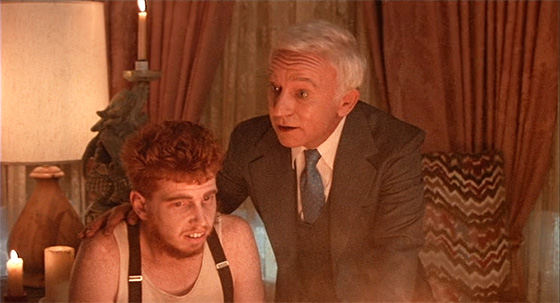
Hans Klopek (Courtney Gains) and The Doctor (Henry Gibson).
The entire cast is at the top of their game. Dern is so perfectly cast – and so hysterical in his aggressive poking and prodding of the Klopeks during his (un)welcome-wagon visit – that I’m left to wonder why he’s so seldom cast in comedies (he recently reunited with Dante for 2009’s The Hole, the latest in the director’s many suburban movies). Canadian stand-up comic Ducommun essentially has the Dan Aykroyd role in this film, and is quite good, but The ‘Burbs wasn’t a box office success, and didn’t propel him to stardom. Carrie Fisher and Wendy Schaal have the thankless roles of “the wives,” but both shine, in particular Fisher, who was already transitioning out of acting to a career as a writer. One of the film’s recurring themes is the men’s regression back to boyhood; a highlight is Fisher denying Dern and Ducommon’s request for Hanks to come out and play. In fact, this may have been one of the reasons the film didn’t quite connect with critics – it seems like many don’t seem to understand that the neighbors’ obnoxiousness toward the Klopeks, and their immaturity and paranoia, is the whole point of the film. Some have criticized the film’s ending, wanting the hammer to come down more strongly on our protagonists (such as: they all end up in prison). But I like what we get instead: something true to the spirit of the film’s retro-horror nature, while still exposing the madness of Hanks and his friends as their behavior comes to a very destructive end. I’m older now, and I see The ‘Burbs from a different perspective. Now I’m married with two dogs and living in the suburbs, where people obsess over their lawns and look down on those who don’t put in the requisite yardwork. The film still clicks, just in a different way. Given the kind words I’ve heard others say toward this film, I think its following has only grown over the decades. It’s one of Dante’s purest and funniest films, and one of his very best.
